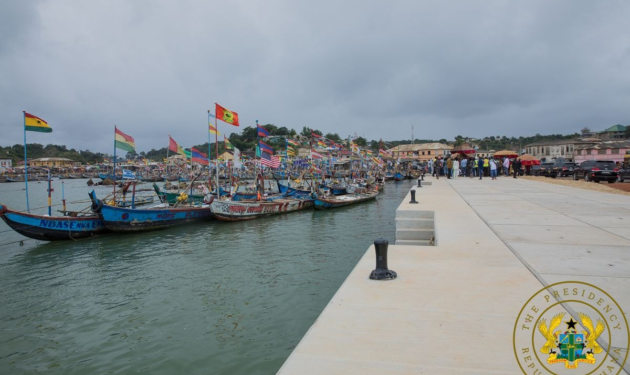It’s the last day of the one-month-long closed season for canoe and inshore fishers in Ghana.
The Closed season is enforced by the Ministry of Fisheries and Aquaculture Development and Fisheries Commission in partnership with the United States Agency for International Development.
The closed season is observed as a way of reducing fishing pressure on stocks when they are most productive, in terms of allowing the fish a chance to lay their eggs to replace the lost population due to fishing and other natural causes.
Fisher folks at Adina in the Ketu South Municipality of the Volta Region are preparing their fishing gear in anticipation of the beginning of the new season.
While some repaired and paint their boats, others were mending their nets.
Isaac Kpeme and his colleague fishers are hoping to have bumper harvests after the closed season, as experienced in previous years.
“We are preparing our fishing gear to go to sea when the closed season ends. We struggled to feed our families during the closed season because we have no other livelihood aside from fishing.
“We had good harvests after the previous closed seasons and we are hoping to have more than what we got in the previous years,” he said.

However, as fisher folks prepare to go back to sea, the Ministry of Fisheries and Aquaculture Development has warned against engaging in illegal fishing activities during their expeditions.
Speaking at a ceremony to officially announce the end the closed season, the Deputy Minister of Fisheries and Aquaculture Development, Moses Anim, counselled fisher folks to adopt responsible fishing practices to reap the benefits of the closed season.
He said his ministry would collaborate with the Ghana Navy and Marine Police unit to intensify monitoring and surveillance of the country’s waters.

He added that the ministerial directive on trawl vessels will continue to curb the harvesting of juvenile fish and address excessive bi-catch and dumping.
“The Ministry with the support of the Ghana Fisheries Recovery Activity is piloting an Electronic Monitoring System (EMS) in trawl vessels to track operations of vessels at sea as part of efforts to combat Illegal, Unreported, and Unreported (IUU) fishing activities.
It is refreshing to note that, fishers have agreed to the implementation of the three (3)-year moratorium on new canoe entrants as a tool to reduce fishing effort and excessive pressure on marine resources“, he indicated.
He lauded the compliance of this year’s closed-season directive across the 187 fishing communities in the country, and assured of periodic supply of premix fuel to the fishing communities.

The Ghana Mission Director of the United States Agency for International Development, Ms. Kimberly Rosen, acknowledged the difficulty fisher folks go through during the closed season, and indicated that it is a “shared annual sacrifice” which is “paying off”.
“This year’s closed season marks Ghana’s fourth closed season, a significant achievement. The biological assessment conducted after the 2022 closed season found that both the number of fish being caught, and the average size of these fishes increased the month after the closed season.
These findings confirm that the closed season is improving fish stocks. USAID has accompanied Ghana on this journey since 2019 when the first closed season was observed”, she said.
The closed season spans between July 1 and 31 for canoe and inshore fishers, while that of industrial trawlers starts from July 1 to August 31, every year.
It was introduced four years ago as a key fisheries management measure as part of USAID’s Feed the Future Ghana Recovery Project to protect young and pregnant fishes in the country’s marine environment.


































